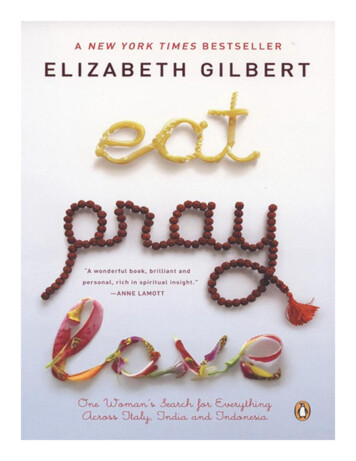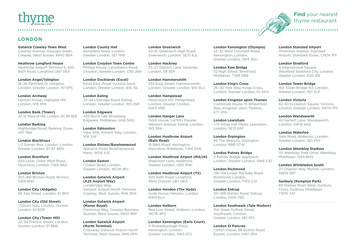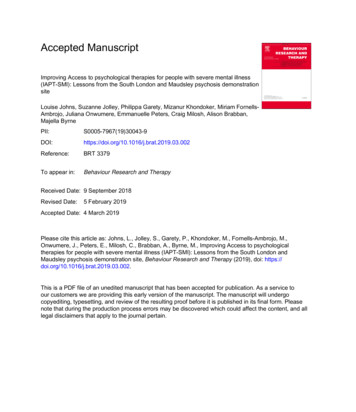
Transcription
LONDON CHAPTER OF DOUAI OBLATESOCCASIONAL PAPERS I20101
BLACKFRIARSPUBLICATIONS Copyright held by each individual author,who alone is responsible for the ideas expressedThe cover photograph shows a group of Douai oblates2
Published and produced by Blackfriars PublicationsCarysfort House, London SW1, 2010CONTENTSIntroduction6Christian Spirituality [Derek Vidler]7The Gift of Silence [David Rees]12Purity of Heart [Klara Brunnhuber]14Chapter VII of the Rule of Benedict [Thomas Brunnhuber]18Obedience [Iain Campbell-King]22What is happening at Vespers? [Simon Bryden-Brook]253
4
5
INTRODUCTIONThese papers were all delivered to the London Chapter of Douai AbbeyOblates between 2008 and 2010. They are not intended as contributions tothe vast scholarship on Benedict and his Rule but as evidence of theattempts being made by one small group of oblates to inform themselvesand to share their insights and enthusiasms with their fellow-oblates, notsimply because they feel they have something to offer but also with thehumble object of stimulating discussion from which they can learn. Someof these papers are brief reflections while others are more detailed essays;some were prepared by oblates holding down fulltime jobs while otherswere produced at a more leisurely pace by oblates with more time. Theyare offered to other oblates of Douai in the hope that they will encouragethat lively discussion on what it means to be an oblate which takes placeduring our exciting oblate retreats at our monastery.It might be of interest to other oblate chapters to hear how the London Chapter ofDouai Oblates structures its meetings. They take place on a weekday evening,simply because the majority work during the day, and last some two and a halfhours. We meet in the living room of one of our members and have a glass ofwine while the meeting gathers. There are usually half a dozen of us.We start with twenty minutes’ silent meditation. Then a paper prepared by oneof us is read and this is followed by discussion. We end with a Table Blessing andsharing of the food and drink we have brought to share.Our meetings take place every second month in central London and we arealways keen to welcome oblates of Douai who live near enough to attend, orindeed those considering becoming oblates of Douai.This, our first collection, is dedicated affectionately to the memory of DerekVidler, a model for all oblates, who died in April 2010. His paper on thecentrality of the Gospel for spirituality is placed first in this collection.Feast of St Benedict11 July 20106
CHRISTIAN SPIRITUALITYDerek VidlerThe only spirituality for the Christian is that of the Gospel and the Gospelreflected in the other writings of the New Testament. I am always suspicious ofthose who speak of Benedictine, Franciscan, Carmelite, Dominican, Theresian,Ignatian or any other spirituality. A spirituality that is not rooted in theGospel of Christ is not worthy of the name of Christian. When St Francis ofAssisi went to Rome to win approval from the Pope for his new religiousorder, the Cardinals of the Roman Curia asked to see his Rule. He repliedthat his only Rule was the Gospel of Christ. This they would not accept.Religious orders had to have a Rule. Francis was to spend the rest of his lifeagonising about this and it continued after his death with the Franciscanssplitting up into a large number of groupings.At the centre of Christian spirituality is the God who is love, the Father of hisSon Jesus Christ. Let us be very clear that it is the Christian relationship withGod which is of supreme importance and without which Christianity becomesa set of rules and regulations. All forms of Christian spirituality are foundedon and catch fire in the example and experience of Jesus and our relationshipwith him. Through Christ in the Holy Spirit we our drawn into a deep andloving relationship with the Trinitarian God, and if this is not as real, in factmore real, than the other relationships of human life, we will not be, as Christintended us to be. The Greek word monos, in its primary meaning in Christianspirituality, is an aloneness, a solitude with God himself. From this basicmeaning developed the word monk and monastery. Being alone with God isnot just for monastics but for every Christian. I think it was Cardinal Humewho once said that the Carthusian search for God in the silence of his cell findsits echo in every Christian.One of my great heroes has been Dag Hammarskjöld who served twice asSecretary-General to the United Nations until his untimely death inSeptember 1961 at the heart of the war in the Belgian Congo. Hammarskjöldwas an outstanding brilliant man with a keen intellect. Hammarskjöld ina rare statement of his fundamental beliefs in 1953 in a radio interview saidthat from generations of soldiers and government officials on his father's sideof the family he inherited a belief that no life was more satisfactory than one ofselfless service to humanity. From scholars and clergyman on his mother's sideof the family he inherited that, in a very radical sense of the Gospels, all wereequals as children of God. He found an explanation of how human beingsshould live a life of active social service in full harmony with themselves asmembers of the community of the spirit: He found this, he wrote, “in thewritings of the great medieval mystics for whom self-surrender had been theway to self-realisation, who in singleness of mind and inwardness had found7
strength to say ‘yes’ to every demand which the needs of neighbour and tosay ‘yes’ to all that life unfolds for us.” Hammarskjold's favourite authorswere Thomas à Kempis The Imitation of Christ and Meister Eckhart.To come to know and love God is a life's time work and will not be completeuntil we see “face to face”. It is a time of growth and development. Jesusoften spent the night in prayer and in his forty days in the desert after hisbaptism by John the Baptist he wrestled with evil. There is no easy path.God is always unknown in himself. We can have some ideas about God;the old Penny Catechism described God as “The being who exists in and ofhimself and is infinite in all perfections”. [Some have said this is really thedefinition of a parish priest!] However, as theologians tell us, God is known bywhat he is not rather than what he is. He has no limits; he is all powerful; heis timeless; he is all seeing and so on. These are ideas telling us what God isnot. The reality is beyond us. A Carthusian novice master has put itsuccinctly; what God is in himself “is entirely hidden from me. God for me isan impenetrable mystery. I can only name Him in comparison with creaturesascribing to Him the perfection of whatever exists in an imperfect state increatures. I know that God is more unlike than like all that is attributed tohim – even all sacred scripture says of him.” The unknown author of theCloud of Unknowing speaks how we must empty ourselves of all our ideasabout God. These are not God – only ideas about Him. In the silence of mindand heart we can pierce the Cloud of Unknowing by love. Therefore I willleave on one side everything I can think and choose for my love that which Icannot think.He may well be loved but not thought. By love He can be caught andheld, but by thinking never. Therefore though it may be goodsometimes to think particularly about God's kindness and worth,and though it may be enlightening too, and a part of contemplation, yetin the work now before us it must be put down and covered with a cloudof unknowing. And you are to step over it resolutely and eagerly, with adevout and kindling love, and try to penetrate the darkness above you.Strike the thick cloud of unknowing with the sharp dart of longinglove, and on no account think of giving up.I am talking about the ordinary Christian life not some life which specialisesas it were in the contemplative life of monks and nuns. In 1953 as he tookup the United Nations Secretary-Generalship Hammarskjöld wrote in hisprivate diary: “Night approaches now. For all that has been – thanks. To allthat shall be – yes.” Shortly afterwards he wrote; “Not I, but God in me”.In April of the same year he quotes from his favourite author Thomas àKempis. “Their lives grounded and sustained by God, are incapable ofpride. They attribute to God whatsoever good they have received, seekno glory from one another, but do all things for the glory of God alone.”In April 1956 he wrote: “Understand – through the stillness; act – out of the8
stillness; conquer – in the stillness.” Less than two months before his death hewrote: “Give us a pure heart that we may see Thee, a humble heart that wemay hear Thee, a heart of love that we may serve Thee, a heart of faith thatwe may love Thee. Thou whom I do not comprehend but who has dedicatedme to my fate, Thou . . . ”Jesus as we have seen often spent time alone in prayer to his Father and herecommended his followers to retire to some quiet place at home to pray, tobe alone with God. This time of silent prayer and searching for God is atthe heart of our Christian calling to be followers of Christ. Nothing canever replace it and nothing can be achieved in the Christian life without it.For us as Christians God has revealed himself fully in the Risen Lord Jesuswho sends the Holy Spirit to dwell in us. In the Liturgy of the Church we prayto the Father through the Son in the Holy Spirit. The ancient heresy ofArianism, which taught that Christ is not truly divine, brought about achange in the wording of many prayers. Take: “Glory be to the Father andto the Son and to the Holy Spirit”. Originally this was “Glory be to the Fatherthrough the Son in the Holy Spirit.” This professes our faith in the TrinitarianGod. We go to the Father through the Son in the Holy Spirit. Notice how someof the oldest prayers of the Liturgy were changed from “Through the Son.”to “Who lives and reigns with the Father and the Holy Spirit.” It is in thesacraments of baptism and confirmation that we come to share in the life ofGod himself. We can call God Our Father. We become like brothers andsisters with Jesus. This is tremendous. We take a new life and a new love. Therelationship that Jesus has to his Father by his divine nature becomes ourrelationship by grace to the Father. Leo the Great in his Christmas sermon saysthat Jesus became man to share our human nature so that we could share inhis divine nature. This is reflected in the silent prayer the priest says at Massas he pours water into the wine when preparing the gifts for sacrifice: “By themystery of this water and wine may we come to share in the divinity ofChrist who humbled himself to share in our humanity.”Greek has four words to express the different sorts of human love. Love forparents and family, for friends, for husband and wives. English has only theone word: “Love”. St Paul when writing to the Corinthians explains to themthe various gifts of the Holy Spirit. But one gift far surpasses all the others –the gift of love. He uses the Greek word charis from which we get words likecharity, grace, charism etc. His paean of Love is too well known to quote butwhat should be noted is that this love he speaks of is a gift of the Holy Spiritwhich enables us to love like God in Christ. It is true it can and does minglewith the other human loves we experience like rich oil poured into water. Itis so much more than what we ordinarily mean by love. It is the love Jesusspoke of when he said “Forgive your enemies”; “Go two miles with the onewho asks you to go one”; to share your goods with others, to take up thecross, to deny oneself.9
In baptism and confirmation we are born again to a new life in Christ. Webecome a branch of the vine, a member of the Body of Christ. There is no I inChristianity; it is always yours or ours. When the disciples asked Jesus how topray they were not asking for a particular prayer but prayer that wouldreflect the Christian family. Jesus gave them the Our Father; not My Fatherbut Our Father. And so it is throughout the Our Father. Christian Prayeralways includes others.In the Acts of the Apostles we hear about the life style of the early Christians:"The whole group of believers was united, heart, and souls: no one claimedprivate ownership of any possessions as everything they owned was held incommon.” The apostles continued to testify to the resurrection of the LordJesus with great power and they were all accorded great respect. None oftheir members was ever in want. (Acts 4:32-35) The early Christians:“Remained faithful to the teaching of the apostles, to the brotherhood andto the breaking of bread and to the prayers.” (Acts 2:42) These fourelements remain a standard for every Christian. To remain faithful to theApostolic witness to the Resurrection of Jesus, crowning all that he hadtaught; to a sharing of one goods so that no one goes needy; faithfulness tothe Eucharist in which Christ's sacrifice is made present for us and Himselfreceived in Holy Communion, and to “the prayers”. I want to pause for amoment on “the prayers.” In the Jewish practice at the time of Our Lord allmales who had become adults (usually 13 or 14 years old) were bound bymorning and evening prayers. They were bound to do this with a minimumof 12 others thus forming a synagogue. The early Church continued theimportance of these morning and evening prayers which by the third centuryhad become distinct offices of psalms, readings and prayers often called theCathedral Offices. It is important to notice that this is quite distinct from whatlater became the Monastic Offices. The first monks merely added five otherhours of prayer together with a lengthy office of readings. This has becomeusual for monastics. The Second Vatican Council in its Decree on the Sacred Liturgyemphasised the importance of the daily office of morning and eveningprayer for all Christians. In doing so it was returning to the very earliesttraditions of the Church.The evangelical counsels of poverty, chastity and obedience are counsels ofperfection for all Christians not just religious. The gospel tells the story ofthe rich young man who had kept all the commandments but was lacking inone thing. Jesus asked him to sell what he had and give to the poor andcome follow. The young man was already a good man and it says, “Jesusloved Him”. He loved him so much he wants the young man to grow evenfurther into that sort of love that Christians have through baptism andconfirmation. Poverty means not being possessive, being able to value allthings as God's gifts. Oscar Wilde was right when he said: “The cynic is theperson who knows the price of everything and the value of nothing.” Chast-10
ity is that love in marriage or in the single life which enriches us in God'slove through faithfulness to our calling to be married or single. Obedienceis given to God alone and is our wholehearted commitment to him ofwhom Jesus said “I come to do my Father's will.” Humility as St. Pauldescribes it in the Letter to the Philippians, the completely emptying out ofself so that we have no obstacles to loving as the Holy Spirit, moves us. Selfputs up a barrier between ourselves and God and stultifies our Christianvocation.I started out with saying I am very suspicious of spiritualities; I want tostress there is only one spirituality, that of the Gospel of Christ. A final wordabout St Benedict: the original monastic communities of men and womenwere all of lay people, ordinary Christians. They were not an exclusive elitebut more a leaven in the dough. St Benedict’s Rule envisages a group ofpeople living together in community. In the Prologue Benedict says thatthey join the group “to do battle under the Lord Christ, the true King”.He stresses that the member must listen to Christ and his words so that hebecome wise like the man who built his house on rock. The community andRule is a school in the service of the Lord. He stresses prayer together andespecial prominence is given to morning and evening prayer. Private ownership is a vice and grumbling a form of self-seeking. The utensils of the kitchenmust be treated as sacred as the vessels for Mass. The world is God’s worldwhich he made and has given us and has been redeemed by Christ. We mustsee this world as God's world. Benedict sums up his rule; “To prefer nothingto the love of Christ.”It was the boast of a pagan Roman author who said, “See how theseChristians love one another.” When St Augustine came to England in thesixth century Bede tells us they didn’t know the language at all wellalthough they had recruited some who could speak to the English on theirway through Southern France. But Bede says it was their way of life thatbrought in the converts because they shared and loved one another. Surely thisis the gift of baptism and in particular of the Holy Spirit coming inConfirmation to make us witnesses to Christ by our way of life,St Paul writing to the Corinthians in answer to questions they had put to himspeaks of the new creation in Christ which is the vocation of all thefollowers of Christ: “What I mean brothers is that the time has becomelimited and from now on those who have spouses should live as thoughthey had none; and those who mourn as though they were not mourning;those who enjoy life as though they did not enjoy it; those who have beenbuying property as though they had no possessions and those who areinvolved with this world as though they were people not engrossed in it,because this world as we know it is passing away.” (1 Cor 7:29-31)A paper read to the London chapter of Douai Abbey Oblates on 20 Oct 200911
THE GIFT OF SILENCEContemplative prayer – Purity of heart – Pure prayerDavid ReesListening in silenceSt. Benedict obviously cherished silence and saw it as a necessity for anyone whowanted to pursue the spiritual path. He devotes a whole chapter of the Rule tosilence (RB 6) as well as mentioning it in a number of other places too. The veryfirst word of the Rule, and the sentences that follow, imply the need for silence:“Listen . . . listen with the ear of the heart”, obviously influenced by the Psalmist(Ps 95): “today if you hear God’s voice, harden not your heart”. How had hearrived at this thinking of the importance of silence?Here we have to revert to the teaching of the 4th Century Desert Fathers in northeast Egypt, the earliest monks. The monk Ithagus handed on to Abbot Isaak andhis monks this approach to silent prayer concentrating on one word such asAbba. This approach is to strive to what they considered pure prayer – prayergoing beyond words and thoughts to empty oneself of the Ego and thereforemaking one accessible to the Holy Spirit; in other words, to LISTEN in silence.You cannot be listening if you are occupied in wording. John Cassian, a monkfrom the Balkans area who visited Fr. Isaak, listened to this teaching and indeedpractised what Fr. Isaak practised and taught, and so recorded this in hisConferences – a handbook for Christian meditation in our own time. It was fromJohn Cassian that St. Benedict learnt about the necessity of silence/silent prayer,to strive for purity of heart, as he termed pure prayer, in our life of prayer.The place of silence in the monasteryBenedict speaks of some of the reasons why his followers should observe silence.First of all personal prayer, lectio divina, and study are hard to achieve in themidst of noise and chatter. He sets aside certain times, seasons and places in themonastery that will provide an environment of silence: “The Oratory must be aplace of prayer . . . when the Work of God is over all must depart in absolutesilence.” (RB 52).During meals there should be complete silence disturbed by no whispering. Onlythe reader’s voice should be heard (RB 39). Yet recognising our humanweaknesses he goes on to say: “I have resolved to keep watch over my ways, sothat I may not sin with my tongue” (RB 6). He further suggests that sometimessilence can be better than speech even when the conversation is about goodthings: “I have accepted silence . . . refraining from words that are good . . .because of the value of silence.” (RB 6) In RB 7 he encourages his disciples to“speak gently and seriously with words that are weighty and restrained”.12
The need for silenceIt may all seem today unnecessarily detailed and perhaps rather negative. Wehave to remember when this was and the kind of people with whom St. Benedictwas dealing, many of whom would have been recent converts from Barbarism(RB 22). So silence was a new idea to many of them – so equally true of our owntimes. What does emerge from the writings of St. Benedict is his deep love andappreciation of silence, not just for the sake of silence but silence for the sake ofsomething – as a way to God and union with him. For Benedict it was a matter ofcultivating an inner stillness and silence in order to LISTEN to God and toexperience his presence within. Whilst it is not easy for any of us, including themonastic, who would be the first to admit it, to incorporate Benedict’s teaching inour lives to find places and time for silence and stillness in our daily lives. Itrequires discipline and faith that leads to practice prayer in silence. Yet we yearnfor silence and stillness if we but realized and accepted it.Pure prayerThis spiritual search for pure prayer – purity of heart is exemplified in theteachings of John Main OSB and as being taught across the world today in trueBenedictine tradition by his successor, Laurence Freeman OSB. Their fellowmonk, Bede Griffiths OSB, was a great follower of the prayer of the heart as hetaught in his Ashram at Santivanan in India with both Hindu and Christianmeditators. This pilgrimage in pure prayer/purity of heart transcends allreligious differences and unites us in our silence that all human beings share incommon how ever much we resist it. Our resistance is because we remain in fearof silence whereas the journey leads us away from fear to the realms of the loveof God in totality. Pure prayer/purity of heart is surely the way we placeourselves at the disposal of the Holy Spirit. How apt that we are sharing this twodays following the Feast of Pentecost.All this proves how tradition in essence and at best prevails from generation togeneration. St. Benedict’s voice comes through in silence into our silence:“LISTEN . . ” he says. In that way we might hear the voice and feel the breath ofGod through the Holy Spirit in our lives.A paper read to the London oblates on 2 June 200913
PURITY OF HEARTKlara BrunnhuberPrologueNothing pains parents more than losing a child—be it physically or in spirit.Nothing, on the other hand proves a father’s love more than letting his son go,allowing him the freedom to make his own choices, accepting that he may usethis freedom to make mistakes, may even use it to turn against the father and cuthimself off completely. Despite all this, a father’s love remains full of hope, full ofpatience, waiting – until one day the prodigal son may return, eventually.In the BeginningIn the beginning, God created heaven and earth. He created life, and in His ownlikeness humankind. Into this tangible, growing, breathing, multiplying world,He poured His love and the greatest gift of all—free choice. In doing so, He gaveup control, made Himself vulnerable, gave man the power to hurt Him where ithurt most: He allowed him to choose to separate himself from his creator.Man and woman were created in a state of perfect innocence. They remainedunaware of this until they fell into sin. As they fell, they fell completely – withbody, mind and soul. The fruit they ate opened indeed the door to a new world –full of thoughts and emotions they never knew existed: knowledge of their ownsin, shame and fear. They gained all this and lost so much more – theunimaginable closeness and unity with God, and with it their inner hold, theirinner axis, their inner self, their true identity.LongingEver since, spiritual people have been longing to regain what has been lost,willing to dedicate their lives to find a way back into God’s presence. With thepsalmist they cried out:“O wash me more and more from my guiltand cleanse me from my sin.O purify me, then I shall be clean,O wash me, I shall be whiter than snow A pure heart create for me, O God,Put a steadfast spirit within me Do not cast me away from your presence,nor deprive me of your holy spirit.”(Psalm 50)11Ps 51 in the Hebrew numbering14
HopeThrough his life, death and resurrection, Jesus has thrown open the gate. Hepromised: “God blesses those people whose hearts are pure. They will see him!”(Matthew 5.8)With the parable of the prodigal son, Jesus laid out for us the necessary steps forobtaining this precious purity: Stop what you are doing — Look around you andrealise the error of your ways — Accept that you are a sinner — Turn away fromsin — Walk the long path back to God — With a humble heart confess your sinsand accept God’s judgement. Only so can you be welcomed back home as a son.Monastic CallingWhat does this mean for people with a monastic calling? One of the desertfathers, Abba Moses explains in The Philokalia2:The goal of our profession is the kingdom of God. Its immediatepurpose, however, is purity of heart, for without this we cannot reach ourgoal . . . We give up country, family, possessions and everything worldlyin order to acquire (it) . . . (But) perfection does not follow immediatelyupon renunciation and withdrawal from the world. Fasts and vigils, thestudy of Scripture, renouncing possessions and everything worldly arenot in themselves perfection ; they are its tools . . . As (St. Paul) says‘Though I give my body to be burned, and have no love, it profits menothing.’ Whoever has achieved love, has God within himself and hisintellect is always with God.The path back to God requires a pure heart. In order to achieve that holy state,we need to show dedication and patience. Ultimately, however, we need muchmore than we can achieve through our own efforts. We need God’s gifts of mercyand love.Let us take a deeper look at the tools that may help us on the way.The Four RenunciationsIn her book Humility matters for practicing the spiritual life3, Margaret Funkdescribes the path leading to a contemplative life and back to God in the form offour renunciations:In the first renunciation, we renounce our former way of life, characterised by theattachments of the ego: at all times we do good and avoid evil. In practical terms,we achieve this by serving the poor, sharing our goods, being faithful infriendships, commitments and work assignments, worshipping with our faith2G.E.H. Palmer, Philip Sherrard, Kallistos Ware ed., The Philokalia – The complete text. Volume 1. Compiledby St Nikodimos of the Holy Mountain and St Makarios of Corinth; Faber and Faber, London, Boston. 1990; 95-96.3Mary Margaret Funk, Humility matters for practicing the spiritual life, Continuum, New York, London. 2006,915
community, contributing to society and the arts, safeguarding the environmentand engaging in dialogue globally. Whenever we sin, we repent and ask forforgiveness and make amends.4In the second renunciation, we renounce the ‘eight thoughts’ that, whenunchecked, lead us down the slope towards our afflictions. Abbot Jamison’ssecond book Finding happiness5 is dedicated to these ‘eight thoughts’ and theirrole in modern life. He summarises: The first three are thoughts about the body:gluttony, lust and greed. The next three are thoughts in the heart and mind:anger, sadness and acedia. The two final ones are in the soul: vanity and pride.The presence of these thoughts does not mean that a person has done somethingwrong; they are present in everybody’s life. Although they come from within us,the ‘eight thoughts’ sometimes seem to be bigger than we are and it feels as ifthey were attacking us from without. The desert fathers and mothers, experts inall matters regarding these thoughts, also called them demons, the servants of theDevil. They understood that these thoughts, if unchecked, make us receptive totemptation, the luring voice that attracts us so forcefully to sin. The fact that Evilis constantly trying and testing us, in no way means that we have no choice butto surrender. Jamison says:When people freely choose to turn the ‘eight thoughts’ into actions, then viceis indulged and the demons have their entry into the soul So the demonsare always working to persuade us to turn our thoughts into vices, but weare completely free to choose not to do so.However, we are not left wholly defenceless in facing the ‘eight thoughts’. AsJamison explains, each of these “has a corresponding opposite virtue: for thethree thoughts of the body these are: for gluttony moderation, for lust chaste loveand for greed generosity. For the three thoughts of the heart and mind: for angergentleness, for sadness gladness and for acedia spiritual awareness. Finally, forthe thoughts in the soul: for vanity magnanimity and for pride humility.”Becoming aware of the existence of the thoughts and their constant fight forsupremacy over the soul does not benefit us as individuals only but has animpact on how we relate to people around us. The purpose of these lists ofthoughts is not an academic exercise, but a framework for developing selfawareness, a practical tool for looking both inwards and outwards, for understanding our interaction with the world, for realising our place in the world.Jamison stresses that living out the discipline of self-awareness is essential notonly for personal happiness but also for society’s happiness.4Funk op cit, 137-1385Christopher Jamison, Finding happiness – Monastic steps for a fulfilling life, Weidenfeldt & Nicolson,London. 2008; 41, 42-43, 53-54.16
The way to liberate ourselves from vicious behaviour is to enter our inner world,name its demons and then ask for help to contain them. It is immenselyimportant that we realise that we cannot go t
Cloud of Unknowing speaks how we must empty ourselves of all our ideas about God. These are not God - only ideas about Him. In the silence of mind and heart we can pierce the Cloud of Unknowing by love. Therefore I will leave on one side everything I can think and choose for my love that which I cannot think. He may well be loved but not thought.










